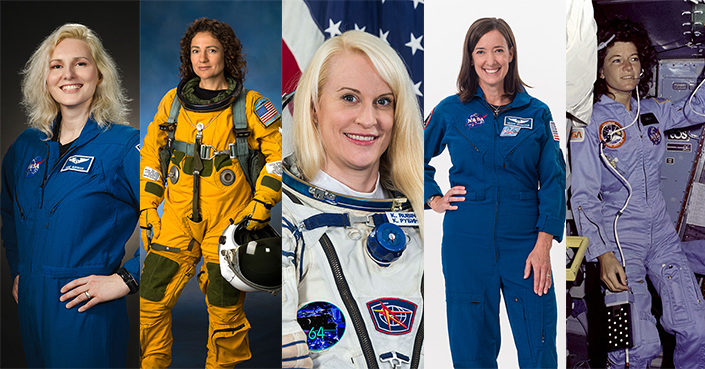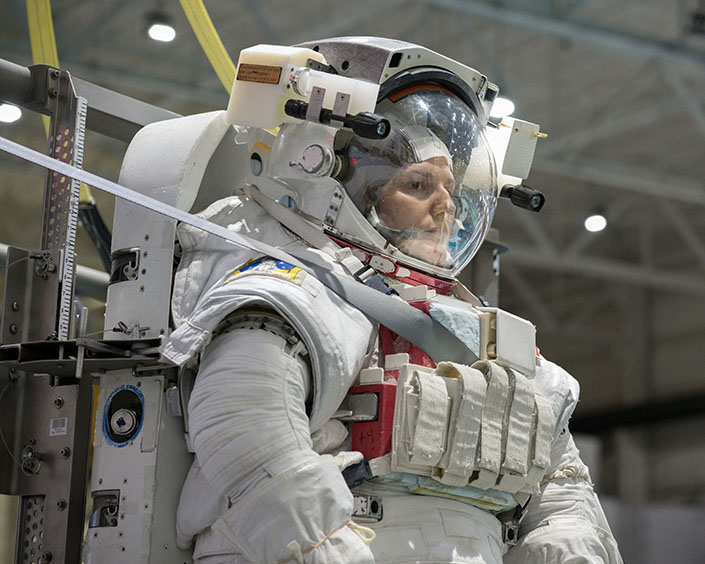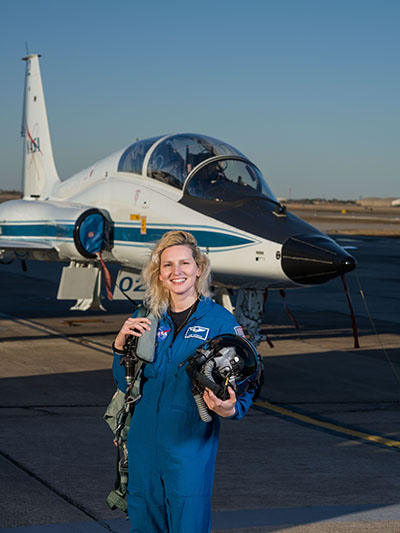UC San Diego Engineering Alumna Selected as Newest NASA Astronaut
Deniz Burnham, who earned a bachelor’s degree in chemical engineering at the University of California San Diego Jacobs School of Engineering, became one of NASA’s newest astronauts on March 5. Burnham, who is part of NASA’s 23rd class of astronauts, graduated from two years of basic training and earned her wings, meaning she is now able to serve on missions to the moon, the International Space Station, and even Mars.
She was one of 12 newly minted astronauts in the class– 10 Americans and two from the United Arab Emirates– selected from a pool of more than 12,000 applicants.
“After this long two-plus year journey of training as an astronaut candidate, we’re honestly just ready to serve,” said Burnham. “We’ll be supporting in our ground jobs while we wait for flight assignments.”
Burnham joins a storied group of three other UC San Diego alumni – all women – to complete training and serve in NASA’s astronaut corps. The first American woman to fly in space, Sally Ride, became a professor at UC San Diego after retiring from NASA.

“This large and growing cadre of pioneering women astronauts from UC San Diego speaks volumes about the rigor in our academic programs and the spirit of exploration in our community,” said Chancellor Pradeep K. Khosla, Chancellor of UC San Diego. “Becoming a NASA astronaut is a dream that only very few people will achieve, and I’m proud that UC San Diego has helped launch four extraordinary women as astronauts. The University of California has now sent more women to space than any other university on the planet, and Deniz, I’m excited for you to join this very exclusive club. Congratulations!”
A leader in the energy industry, an Engineering Duty Officer in the Navy Reserves, a private pilot of both planes and helicopters, and a paraglider, Burnham brings a wealth of experience to the job.
“Studying engineering is all about learning how to think critically and approaching challenging problems from different perspectives, especially when you’re working on assignments as a group,” she said. “These are the skills that are very useful. You’re always going to come up with a problem that you’ve never seen before, but you’re developing the skills to not be afraid to take on that challenge.”
Burnham, who was born on Incirlik Air Base in Adana, Turkey, moved to California before high school, when her mom was stationed at Travis Air Force Base in northern California.
“I always wanted to be a NASA astronaut but I didn’t quite know the path I would take to get there,” Burnham said. “I knew I wanted to be an engineer– there’s a STEM requirement for astronaut selection, but specifically engineering is what spoke to me because I liked the application aspect.”
Having gone to high school in California, Burnham focused her college search in-state, and was accepted into the Jacobs School of Engineering’s prestigious chemical engineering program. While on campus she participated in the crew team, and had several valuable internships, including at General Atomics and Sanford Burnham Prebys.
“Those were great experiences. There were so many opportunities available as a student there, getting to try different industries through internships was important. And I decided that I wanted the challenges that would present themselves in the oil and gas industry so that’s the route I went, which took me out of San Diego.”
Just about as far from San Diego as you could get, really. Right after graduation, Burnham headed to the Arctic for her first of many assignments managing onsite drilling projects on oil rigs for over a decade. Skills she gained through her work in the energy industry continued to prepare her for her role as an astronaut.
“The time-critical decision making skills, having to work in team environments where you are affecting others and the decisions affect you; you are sticking to procedures; you’re living in really remote locations – those are the skills I thought served me well.”
Burnham went on to earn a master’s degree in mechanical engineering from the University of Southern California before being selected as an astronaut candidate in 2021. The two years of training covered everything from space flight readiness training; learning to fly the T38 jet; developing space walking skills in the underwater Neutral Buoyancy Lab; wilderness and water survival training; Russian language lessons; and ISS foundation setting for deep space exploration. For Burnham, the space suit training was both the most challenging and most rewarding.
“In the Neutral Buoyancy Lab doing space walk training was physically very challenging but it’s very rewarding,” Burnahm said. “You’re in a space suit for six hours and only have water, it’s physically challenging because it’s a pressurized suit so you’re kind of working against it and are very focused on some challenging tasks. But you’re working with your teammate and when you complete the task, that sense of accomplishment is very sweet. Some of these trainings can be development runs when you’re testing out a procedure that can directly help a future run in space, so it’s nice that it also has a real world application.”


Burnham and her fellow graduates in this 23rd class of astronauts are part of NASA’s Artemis generation. Artemis is focused on collaborating with commercial partners (SpaceX and Boeing both have vehicles to deliver crews into space, for example), and international partners to return to the moon, with plans to establish the first long-term presence on the Moon, and use that knowledge to tackle the next frontier: Mars.
Burnham is now eligible for any of these missions. Until she gets her first flight assignment, she’ll be supporting NASA through a ground job, which could include as a mission control capsule communicator; supporting the commercial crew programs; or even space suit design and development.
Though she’s not hundreds or even hundreds of thousands of miles above Earth just yet, Burnham said she does miss San Diego.
“I definitely miss San Diego. UC San Diego is located in a beautiful area– La Jolla is beautiful, but also Geisel Library and the buildings are beautiful. Since I’m in the Navy Reserves I did get the opportunity to go back out to San Diego several years ago and visit the campus, and it had changed some, but I walked through it and I missed the dorm areas and all the friends. That was the most important part of it, right, the human relationships.”

